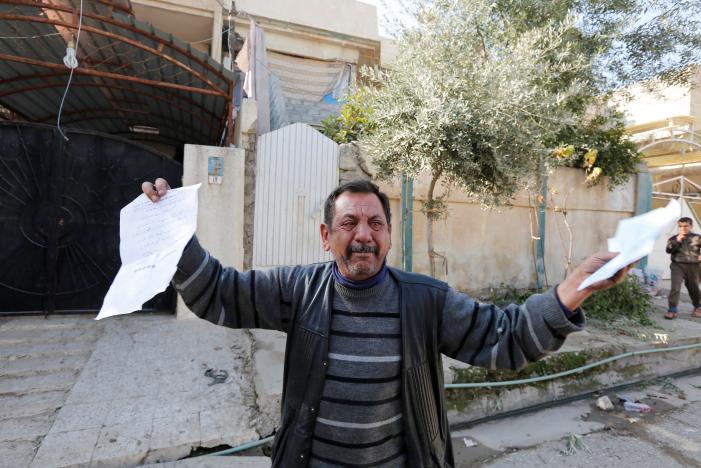Mosul- Iraqi soldiers kicked in the gate of a home in eastern Mosul and emerged moments later with two young men whose hands they bound with plastic ties and dragged off towards black Humvees.
The men, at least one suspected of belonging to ISIS, denied ties to the militants who had been pushed out of the neighborhood a few days earlier. They were pale with fear as they knelt on the ground.
Neighbors gathered around, most staring intently but saying nothing. The soldiers loaded the suspects into their vehicles and drove off.
Moments earlier and just a few doors down, a middle-aged widower with a wrinkled face had pleaded with the soldiers’ commander to avenge ISIS’ alleged murder of his brother, wife and son.
“Save us from them, save us from these disbelievers!” he shrieked.
These types of episodes are playing out regularly in the increasing number of areas in eastern Mosul where Iraqi forces have pushed out ISIS in a three-month, U.S.-backed offensive to retake the militants’ largest urban stronghold.
For ordinary residents, a mix of emotions often accompanies the advance, which has picked up pace since the start of the year.
There is often initial relief at the clashes moving past their doorsteps and gratitude to the Iraqi soldiers, whom they ply with sweetened tea and kisses.
The trauma accumulated over 2-1/2 years of the jihadists’ repressive rule also often pours out unprompted – loved ones brutally murdered, homes looted and destroyed, livelihoods decimated, dreams extinguished.
Some people are unafraid to air their grievances or finger their transgressors, but others are more cautious, fearful that ISIS supporters remain at large and are watching.
While hundreds, perhaps thousands, of fighters have been killed in the Mosul battle, residents and security officials fear some have simply shaved their beards and melted back into the civilian population.
The Mosul campaign, involving a 100,000-strong ground force of Iraqi troops, members of the autonomous Kurdish security forces and mainly Shi’ite militiamen, is the most complex battle in Iraq since the U.S.-led invasion in 2003.
With much of the eastern half of the city now under government control, most residents have stayed in their homes or moved in temporarily with relatives in other neighborhoods.
That has complicated the task of the military, which must fight among civilians in built-up areas against an enemy that has targeted non-combatants and hidden among them.
Commanders from the elite Counter-Terrorism Service (CTS), which has spearheaded the offensive, regularly stop during visits to recently recaptured areas to speak with residents, many of whom know them by name.
In front of a partially destroyed mosque in the Baladiyat district on Wednesday, Lieutenant General Abdelwahab al-Saadi removed his cap and bowed his head so an elderly man could kiss him on the forehead. He later greeted a toddler watching frontline clashes from atop a garden wall.
In the nearby Sukkar district, women ululated from inside a home as Saadi and other top commanders passed by. They unlatched the door momentarily to toss sweets to the troops.
The charred remains of a suicide bomber still littered the street outside.
The military says it regularly relies on tips from residents to identify ISIS infiltrators. One military command post has a hotline number for security information graffitied on its outer wall.
Civilians also bring their concerns to the military which they regard as the new sheriff in town, even though the troops remain focused on the battle.
Residents’ requests are largely mundane. A young man’s car got stuck in the mud, can the military help pull it out? Another man’s car is parked near the frontlines, can someone retrieve it for him?
“Please tell someone we just need them to fix the pipe up at the top of the street so we can get our water back,” an elderly man says. Water has been cut off in many areas for weeks and electricity is only available by generator for a few hours a day.
In al-Qadisiya al-Thaniya district, which Iraqi forces recaptured about two months ago, local men stood outside a schoolyard on Wednesday discussing the future of their city.
“Mosul needs a military ruler,” said resident Alaa. “We cannot allow something like this to happen again.”
Civilians also bring their concerns to the military which they regard as the new sheriff in town, even though the troops remain focused on the battle.
